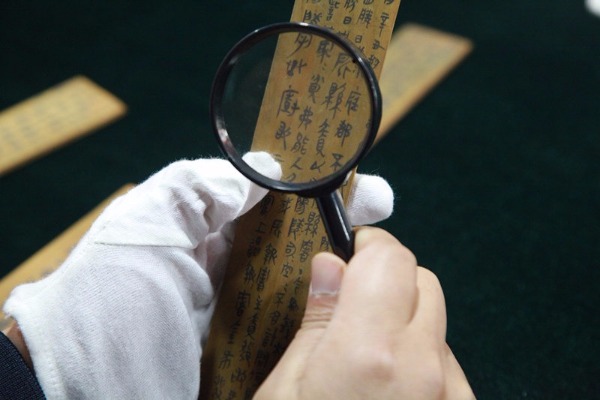Slips reveal emperor's pursuit of immortality
Xinhua | Updated: 2017-12-27 08:47

CHANGSHA - The pursuit of immortality was commonplace among the most powerful of people in ancient China - emperors.
According to new archaeological findings, China's first emperor, Qin Shihuang, even went so far as to make it a government function, more than 2,000 years ago. A set of wooden slips found in Hunan province contain the emperor's executive order for a nationwide search for the elixir of life and official replies from local governments.
Zhang Chunlong, a researcher at the Hunan Institute of Archaeology, said the emperor's decree reached frontier regions and remote villages.
According to the calligraphic script on the narrow wooden slips, a village called Duxiang reported that no miraculous potion had been found yet and implied that the search would continue. Another place, Langya, which is in modern-day Shandong province, presented a herb collected from an auspicious local mountain.
The discovery demonstrated the emperor's centralization of authority.
"It required a highly efficient administration and strong executive force to pass down a government decree in ancient times when transportation and communication facilities were undeveloped," Zhang said.
Ying Zheng was the first person to unify China and declared himself Qin Shihuang, or the first emperor of the Qin Dynasty (221-206 BC). To consolidate his power, he standardized the system of weights and measures, and issued currency.
A previous study of the slips suggested the Qin Dynasty already had a mail service, probably even express delivery.
However, most historians see Ying Zheng, who lived from 259 to 210 BC according to records, as one of the most brutal tyrants of China's feudal society, who threw millions of land laborers into slavery and forced them to build the Great Wall and his mammoth imperial palace and mausoleum.
The wooden slips - over 36,000 carved with more than 200,000 Chinese characters - were discovered in June 2002 in an abandoned well in Liye village, in western Hunan. The slips dated from 222 to 208 BC and covered politics, military, economy, law, culture and medicine.
After careful study of the 48 medicine-related slips, Zhang said the Qin Dynasty, though it lasted just 15 years, had a sophisticated medical system and documentation, as well as multiple treatments that continued to be used for a long time.
Zhou Qi, an assistant research fellow at the China Academy of Chinese Medical Sciences, said people at the time knew various treatments of traditional Chinese medicine, such as moxibustion, acupuncture, oral administration and topical therapy.
The slips also revealed that doctors were only allowed to treat patients under the direction of the government, and treatment details had to be recorded in official documents. The patients mostly came from the upper class.
The Qin Dynasty left behind few records, and most major events of the dynasty are only known through historical writings of the ensuing Han Dynasty (206 BC-AD 220).
"The new discoveries shed light upon China's ancient medical history and fill in some gaps regarding the emperor's governance," Zhang said.
























